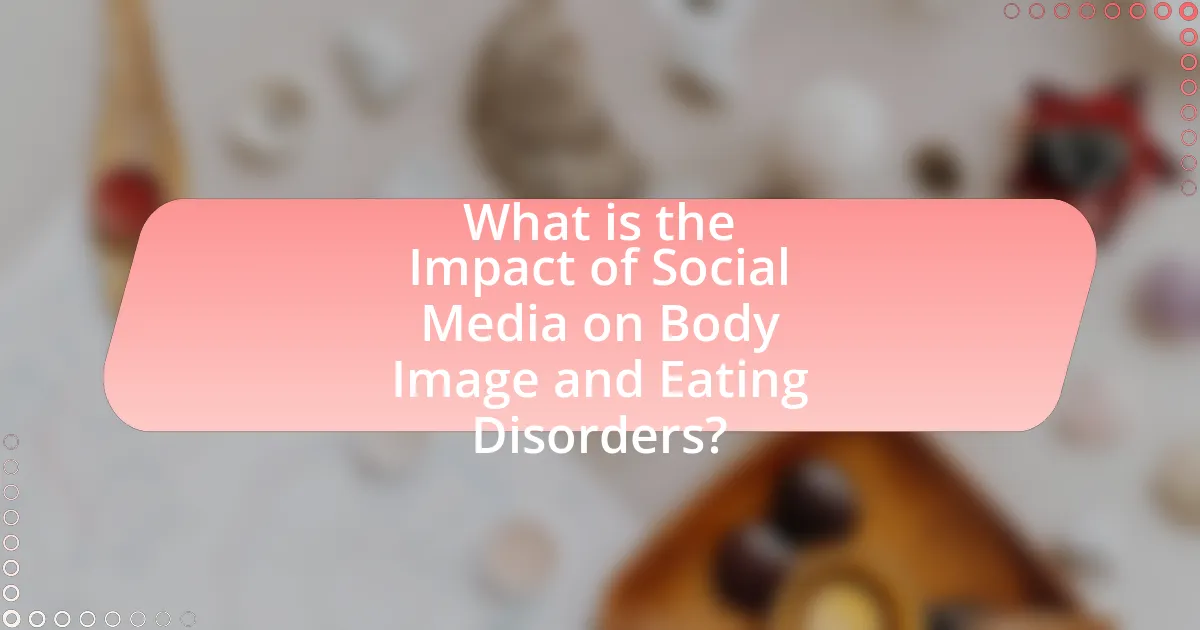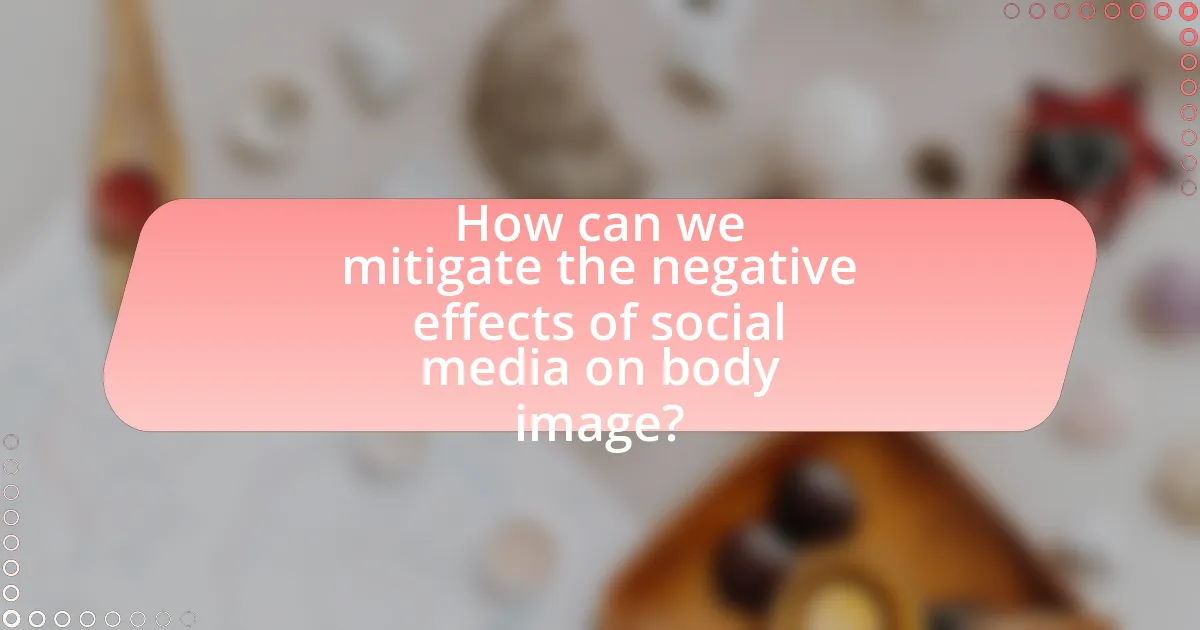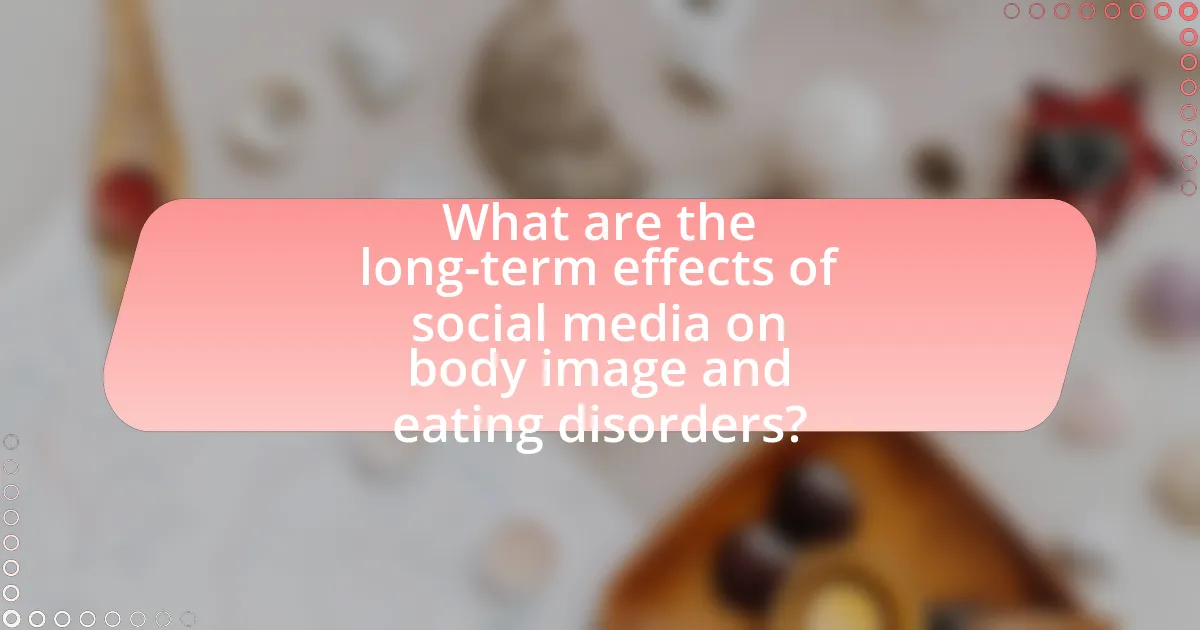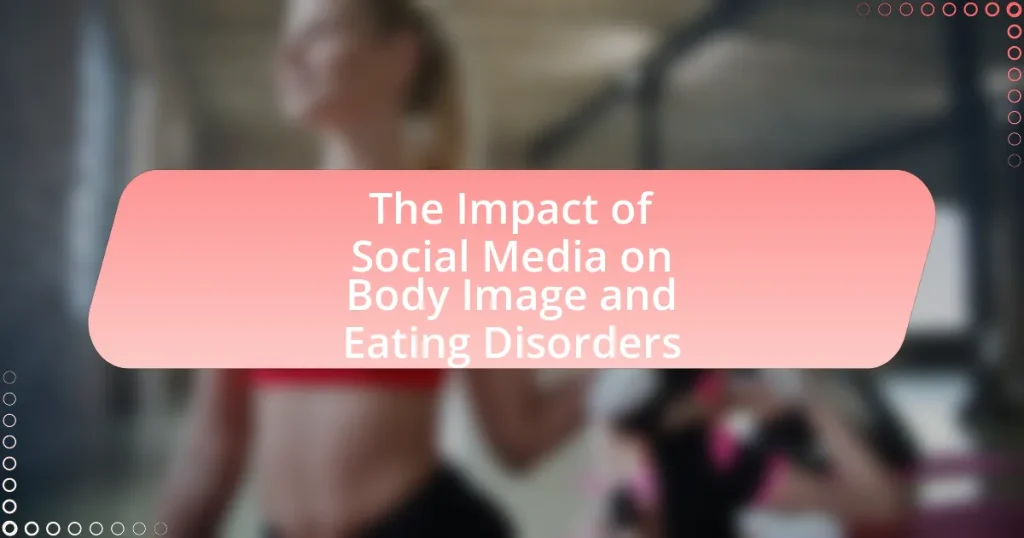The article examines the significant impact of social media on body image and the development of eating disorders. It highlights how exposure to idealized body images on platforms such as Instagram and Facebook can lead to negative self-perception, body dissatisfaction, and disordered eating behaviors, particularly among young women. The article discusses the role of social media in shaping beauty standards, the influence of likes and comments on self-esteem, and the demographic factors that affect vulnerability to these issues. Additionally, it explores strategies for mitigating negative effects, including promoting body positivity, enhancing media literacy, and fostering self-care practices. The long-term psychological consequences of social media usage, including increased risk of eating disorders, are also addressed, underscoring the need for awareness and proactive measures.

What is the Impact of Social Media on Body Image and Eating Disorders?
Social media significantly impacts body image and contributes to the development of eating disorders. Research indicates that exposure to idealized body images on platforms like Instagram and Facebook can lead to negative self-perception and body dissatisfaction. A study published in the journal “Body Image” found that individuals who frequently engage with appearance-focused content are more likely to experience disordered eating behaviors. Furthermore, the prevalence of edited and filtered images creates unrealistic beauty standards, exacerbating feelings of inadequacy and promoting unhealthy dieting practices.
How does social media influence perceptions of body image?
Social media significantly influences perceptions of body image by promoting idealized and often unrealistic standards of beauty. Research indicates that exposure to images of thin and fit individuals on platforms like Instagram and Facebook can lead to body dissatisfaction among users, particularly young women. A study published in the journal “Body Image” found that individuals who frequently engage with appearance-focused content are more likely to experience negative body image and disordered eating behaviors. This correlation highlights the impact of social media on self-esteem and body perception, as users compare themselves to curated images that often do not reflect reality.
What role do social media platforms play in shaping beauty standards?
Social media platforms significantly influence beauty standards by promoting idealized images and lifestyles that often prioritize unrealistic physical attributes. Research indicates that exposure to curated content on platforms like Instagram and TikTok can lead to increased body dissatisfaction among users, particularly young women. A study published in the journal “Body Image” found that individuals who frequently engage with beauty-related content on social media are more likely to develop negative self-perceptions and unhealthy eating behaviors. This correlation highlights how social media not only reflects but actively shapes societal norms regarding beauty, often setting unattainable standards that can adversely affect mental health and body image.
How do likes and comments affect self-esteem related to body image?
Likes and comments on social media significantly influence self-esteem related to body image by reinforcing or undermining individuals’ perceptions of their physical appearance. Positive feedback, such as likes and supportive comments, can enhance self-esteem and promote a more favorable body image, as individuals often equate social validation with personal worth. Conversely, negative comments or a lack of engagement can lead to feelings of inadequacy and lower self-esteem, as individuals may internalize criticism or perceive themselves as less attractive compared to others. Research published in the journal “Body Image” by Tiggemann and Slater (2014) found that increased exposure to social media images and interactions correlates with body dissatisfaction and lower self-esteem among adolescents, highlighting the profound impact of social media feedback on body image perceptions.
Why are eating disorders linked to social media usage?
Eating disorders are linked to social media usage primarily due to the pervasive exposure to idealized body images and unrealistic beauty standards. Research indicates that social media platforms often promote content that emphasizes thinness and muscularity, which can lead to body dissatisfaction among users. A study published in the journal “Eating Behaviors” found that individuals who frequently engage with appearance-focused content on social media are more likely to develop disordered eating behaviors. Additionally, the constant comparison to curated images can exacerbate feelings of inadequacy and low self-esteem, further contributing to the risk of eating disorders.
What types of eating disorders are most commonly associated with social media?
The types of eating disorders most commonly associated with social media are anorexia nervosa, bulimia nervosa, and binge eating disorder. Research indicates that social media platforms often promote unrealistic body standards, which can exacerbate these disorders. For instance, a study published in the journal “Eating Behaviors” found that exposure to idealized body images on social media correlates with increased body dissatisfaction and disordered eating behaviors among adolescents. This highlights the significant impact social media has on the prevalence of these eating disorders.
How does social media promote unhealthy eating behaviors?
Social media promotes unhealthy eating behaviors by normalizing unrealistic body standards and glorifying unhealthy food choices. Platforms often showcase images of highly edited bodies and promote diets that emphasize extreme weight loss, leading users to develop negative body image and unhealthy eating habits. Research indicates that exposure to idealized body images on social media correlates with increased disordered eating behaviors, as evidenced by a study published in the journal “Eating Behaviors” which found that individuals who frequently engage with fitness and diet-related content are more likely to exhibit binge eating and restrictive dieting patterns.
What demographic factors influence the impact of social media on body image?
Demographic factors such as age, gender, ethnicity, and socioeconomic status significantly influence the impact of social media on body image. Research indicates that younger individuals, particularly adolescents and young adults, are more susceptible to negative body image perceptions due to social media exposure, with studies showing that 70% of adolescents report feeling pressure to look a certain way online. Gender differences also play a crucial role; females are more likely to experience body dissatisfaction linked to social media, with 80% of women reporting that social media affects their self-esteem. Ethnic background can influence body image perceptions, as cultural standards of beauty vary, impacting how individuals interpret social media content. Additionally, socioeconomic status affects access to social media and the types of content consumed, which can further shape body image perceptions.
How do age and gender affect vulnerability to social media’s influence?
Age and gender significantly affect vulnerability to social media’s influence, with younger individuals and females generally exhibiting higher susceptibility. Research indicates that adolescents, particularly girls, are more likely to internalize unrealistic body standards portrayed on social media, leading to negative body image and increased risk of eating disorders. A study published in the journal “Body Image” found that girls aged 12 to 19 reported higher levels of body dissatisfaction correlated with social media exposure compared to their male counterparts. Additionally, older adults tend to be less influenced by social media due to more established self-concepts and resilience against external pressures. Thus, age and gender play critical roles in determining how individuals respond to social media content related to body image and eating behaviors.
What role does cultural background play in the perception of body image on social media?
Cultural background significantly influences the perception of body image on social media by shaping ideals of beauty and self-worth. Different cultures have distinct standards for attractiveness, which are often reflected in the content shared on social media platforms. For instance, Western cultures may prioritize thinness as an ideal, while other cultures might celebrate curvier body types. Research indicates that exposure to culturally specific beauty standards on social media can lead to varying levels of body dissatisfaction among individuals. A study published in the “International Journal of Eating Disorders” found that cultural factors, such as ethnicity and societal norms, play a crucial role in how individuals interpret images and messages related to body image online. This demonstrates that cultural background is a key determinant in shaping individual perceptions and experiences regarding body image in the context of social media.

How can we mitigate the negative effects of social media on body image?
To mitigate the negative effects of social media on body image, individuals and organizations can promote body positivity and media literacy. Research indicates that exposure to idealized body images on social media can lead to body dissatisfaction and eating disorders; for instance, a study published in the journal “Body Image” found that social media use correlates with increased body dissatisfaction among adolescents. By encouraging users to critically evaluate the content they consume and to follow accounts that promote diverse body types, we can foster a healthier self-image. Additionally, implementing educational programs that teach young people about the unrealistic nature of social media portrayals can further reduce the harmful impact on body image.
What strategies can individuals use to protect their body image?
Individuals can protect their body image by cultivating a positive self-image, setting boundaries with social media, and engaging in self-care practices. Cultivating a positive self-image involves focusing on personal strengths and achievements rather than physical appearance, which can reduce the impact of negative comparisons often seen on social media. Setting boundaries with social media includes limiting exposure to accounts that promote unrealistic body standards and unfollowing content that triggers negative feelings about one’s body. Engaging in self-care practices, such as regular physical activity and mindfulness, can enhance overall well-being and foster a healthier relationship with one’s body. Research indicates that individuals who actively manage their social media consumption and prioritize self-acceptance report higher levels of body satisfaction (Tiggemann & Slater, 2014, Body Image).
How can social media literacy help in combating negative body image?
Social media literacy can help combat negative body image by equipping individuals with the skills to critically analyze and interpret online content. This understanding allows users to recognize unrealistic beauty standards often perpetuated by influencers and advertisements, which can distort self-perception. Research indicates that individuals with higher media literacy are less likely to internalize these harmful ideals, leading to improved body satisfaction and self-esteem. For instance, a study published in the journal “Body Image” found that media literacy interventions significantly reduced body dissatisfaction among adolescents, demonstrating the effectiveness of education in fostering a healthier relationship with media portrayals of body image.
What role does self-care play in maintaining a positive body image?
Self-care plays a crucial role in maintaining a positive body image by promoting self-acceptance and enhancing overall well-being. Engaging in self-care activities, such as regular exercise, healthy eating, and mindfulness practices, can improve mental health and foster a more positive perception of one’s body. Research indicates that individuals who practice self-care are more likely to develop resilience against negative body image influenced by social media, which often portrays unrealistic beauty standards. A study published in the journal “Body Image” found that self-compassion, a key component of self-care, is significantly associated with a healthier body image and lower levels of disordered eating behaviors. Thus, self-care not only supports physical health but also reinforces a positive self-view, counteracting the detrimental effects of social media on body image.
How can social media platforms contribute to positive body image?
Social media platforms can contribute to positive body image by promoting diverse representations of beauty and fostering supportive communities. These platforms often feature campaigns that celebrate body positivity, such as the #BodyPositive movement, which encourages users to share images and stories that challenge traditional beauty standards. Research indicates that exposure to diverse body types can enhance self-acceptance and reduce body dissatisfaction. For instance, a study published in the journal “Body Image” found that individuals who engage with body-positive content report higher levels of body satisfaction and lower levels of disordered eating behaviors. By amplifying voices that advocate for inclusivity and self-love, social media can play a significant role in shaping healthier perceptions of body image.
What initiatives have been taken by platforms to promote body positivity?
Platforms have implemented various initiatives to promote body positivity, including campaigns that celebrate diverse body types and partnerships with body-positive influencers. For instance, Instagram launched the #BodyPositivity campaign to encourage users to share their own body-positive stories and images, fostering a supportive community. Additionally, TikTok has introduced features that highlight body diversity, such as the “Body Positivity” hashtag, which has garnered millions of views, showcasing content that challenges traditional beauty standards. These initiatives aim to create a more inclusive environment and combat negative body image perceptions among users.
How can influencers use their platforms to foster healthy body image discussions?
Influencers can foster healthy body image discussions by promoting body positivity and sharing diverse representations of beauty. By showcasing a range of body types, skin tones, and personal stories, influencers can challenge societal norms and encourage their followers to embrace their individuality. Research indicates that exposure to diverse body representations can improve body satisfaction and reduce the prevalence of eating disorders among viewers. For instance, a study published in the journal “Body Image” found that individuals who engage with body-positive content report higher self-esteem and a more positive body image. Therefore, influencers play a crucial role in shaping perceptions and encouraging open conversations about body image issues.

What are the long-term effects of social media on body image and eating disorders?
The long-term effects of social media on body image and eating disorders include increased body dissatisfaction, the development of eating disorders, and the perpetuation of unhealthy beauty standards. Research indicates that prolonged exposure to idealized images on social media platforms can lead to negative self-perception and a higher likelihood of engaging in disordered eating behaviors. A study published in the journal “Body Image” found that individuals who frequently use social media are more likely to experience body dissatisfaction and engage in behaviors such as dieting and excessive exercise. Furthermore, a meta-analysis in “Psychological Bulletin” highlighted that social media use correlates with a rise in eating disorders, particularly among adolescents and young adults. These findings underscore the significant impact social media has on shaping perceptions of body image and contributing to the prevalence of eating disorders.
How does prolonged exposure to social media affect mental health?
Prolonged exposure to social media negatively affects mental health by increasing feelings of anxiety, depression, and low self-esteem. Research indicates that individuals who spend more time on social media platforms are more likely to experience these mental health issues due to constant comparisons with idealized images and lifestyles presented online. A study published in the journal “Cyberpsychology, Behavior, and Social Networking” found that higher social media usage correlates with increased body dissatisfaction and eating disorders, particularly among adolescents. This connection highlights the detrimental impact of social media on mental well-being, emphasizing the need for awareness and moderation in usage.
What are the psychological consequences of negative body image over time?
Negative body image over time can lead to significant psychological consequences, including increased risk of depression, anxiety, and low self-esteem. Research indicates that individuals with a persistent negative body image are more likely to develop mental health disorders; for instance, a study published in the journal “Body Image” found that 70% of women with negative body image reported symptoms of depression. Additionally, negative body image can contribute to disordered eating behaviors, as evidenced by findings from the National Eating Disorders Association, which state that individuals with body dissatisfaction are at a higher risk for developing eating disorders. Over time, these psychological effects can create a cycle of negative self-perception and mental health decline, reinforcing the importance of addressing body image issues early.
How can chronic eating disorders develop from social media influences?
Chronic eating disorders can develop from social media influences through the promotion of unrealistic body standards and the normalization of unhealthy behaviors. Social media platforms often showcase idealized images that emphasize thinness and specific body types, leading individuals to internalize these standards as benchmarks for their own bodies. Research indicates that exposure to such content can increase body dissatisfaction, which is a significant risk factor for the development of eating disorders. A study published in the journal “Eating Disorders” found that individuals who frequently engage with appearance-focused social media content are more likely to exhibit disordered eating behaviors. This correlation highlights how social media can contribute to a cycle of negative self-perception and unhealthy eating habits, ultimately resulting in chronic eating disorders.
What research exists on the correlation between social media and eating disorders?
Research indicates a significant correlation between social media use and the prevalence of eating disorders. A study by Fardouly et al. (2015) published in the journal “Body Image” found that exposure to idealized images on social media platforms can lead to body dissatisfaction and disordered eating behaviors among young women. Additionally, a meta-analysis by Tiggemann and Slater (2014) in “International Journal of Eating Disorders” revealed that social media engagement is associated with increased risk of eating disorders, particularly among adolescents. These findings underscore the impact of social media on body image and highlight its role as a contributing factor to the development of eating disorders.
What findings have studies revealed about social media’s impact on body image?
Studies have revealed that social media significantly influences body image perceptions, often leading to negative self-esteem and body dissatisfaction. Research indicates that exposure to idealized images on platforms like Instagram and Facebook correlates with increased body dissatisfaction among users, particularly young women. For instance, a study published in the journal “Body Image” found that individuals who frequently engage with appearance-focused content report higher levels of body dissatisfaction and a greater likelihood of developing eating disorders. Additionally, a meta-analysis in “Psychological Bulletin” highlighted that social media use is associated with a rise in body image concerns, emphasizing the detrimental effects of social comparison and the internalization of unrealistic beauty standards.
How do longitudinal studies contribute to understanding this issue?
Longitudinal studies contribute to understanding the impact of social media on body image and eating disorders by tracking changes in individuals over time, allowing researchers to establish causal relationships. These studies provide data on how prolonged exposure to social media influences self-esteem, body dissatisfaction, and disordered eating behaviors. For instance, research published in the journal “Body Image” by Fardouly et al. (2015) demonstrated that young women who frequently engage with appearance-focused social media content report higher levels of body dissatisfaction over time. This evidence highlights the role of social media as a significant factor in the development of negative body image and eating disorders, reinforcing the importance of longitudinal research in identifying trends and effects that cross-sectional studies may overlook.
What practical steps can individuals take to foster a healthier relationship with social media?
Individuals can foster a healthier relationship with social media by setting specific time limits for usage. Research indicates that excessive social media use is linked to negative body image and increased risk of eating disorders, with a study published in the journal “Body Image” showing that individuals who spend more than two hours daily on social media report higher levels of body dissatisfaction. Additionally, individuals should curate their feeds by unfollowing accounts that promote unrealistic body standards and following those that promote body positivity and diversity. This approach can help mitigate harmful comparisons and enhance self-esteem, as supported by findings from the “International Journal of Eating Disorders,” which highlight the positive effects of exposure to diverse body types on body image. Lastly, individuals should engage in mindful consumption by reflecting on their feelings after using social media, allowing them to identify triggers that may lead to negative self-perception.


